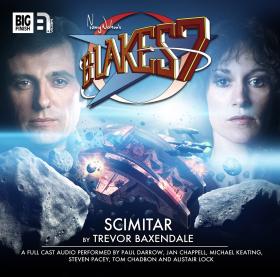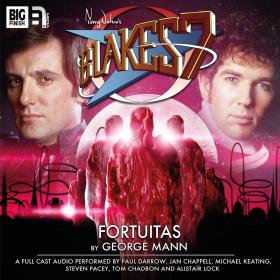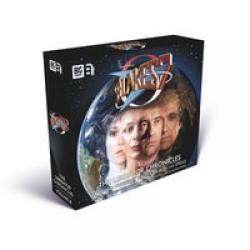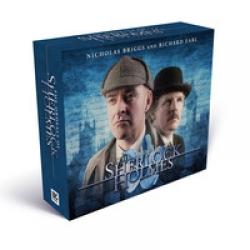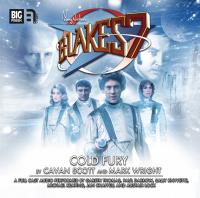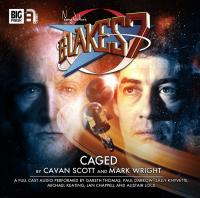Blake's 7 - The Liberator Chronicles - Vol 10
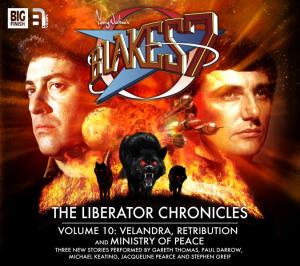
Velandra / Retribution / Ministry of Peace (Blake's 7: The Classic Audio Adventures)
Written by Steve Lyons, Andrew Smith and Una McCormack
Directed by Lisa Bowerman and Ken Bentley
Big Finish Productions, November 2014
“Unconscious – for the second time in two days! Blake isn’t paying me enough for this! Come to think of it, Blake isn’t paying me at all!”
Avon, Blake’s 7 – The Liberator Chronicles 10.3: Ministry of Peace
In the last year, Big Finish’s Blake’s 7 audio adventures – both the full cast dramatisations and the narrative tales – have largely occurred in the latter thirds of the TV series’ second and third seasons, both before and after the titular hero departed the Liberator. Volume 10 of The Liberator Chronicles returns listeners to the program’s first season, certainly before the Liberator crew acquired Orac and long before Gan’s death in the second series.
The three serials – Velandra, Retribution and Ministry of Peace – carry a common, underlying theme of rebellion. The Liberator either visits or is drawn to worlds which are either actively resisting or whose independence is threatened by the Federation. This loose thread is window dressing for some quite diverse stories, particularly in terms of the styles of narration. Velandra is predominantly told from Blake’s (Gareth Thomas) point of view, coupled with exchanges between him and arch nemesis Travis (reprised by the original – and for many fans the best – actor Stephen Greif). Vila (Michael Keating) recounts the events of Retribution, with Avon (Paul Darrow) playing a substantial role in the story. Ministry of Peace is largely told by Avon, with Darrow doubling for numerous characters and only getting a breather thanks to some interludes involving Servalan (Jacqueline Pearce).
Velandra provides a tantalising glimpse of Blake’s history as a rebel before he was reconditioned and sentenced to exile on Cygnus Alpha. That history is captured in the form of a recurring nightmare that involves a young woman, some cybernetically-augmented wolves and Travis. Steve Lyons’ script seeks to challenge not just Blake’s sanity but also the listener’s logic. By the end of the tale, you are left wondering just how much of Blake’s story is truth and how much of it is delusion. If this were a one-off political thriller, there might be good cause to agree that the protagonist has an overly vivid imagination and that his experiences are an elaborate hoax. However, when you as the listener have extensive knowledge of the larger space opera TV series that this serial is based on, then the question of what is “real” or “true” is a moot point.
Lyons, however, does make the listener think about Blake’s personality type. Given how driven, determined and idealistic he is, could it have been possible that Blake even early in his campaign against the Federation succumbed to paranoia and zeal? It would certainly explain why he was so easily influenced in the episode Voice from the Past (1979) and was also so fanatical at various times in the second season. It could also possibly account for his uncharacteristic behaviour in the TV series’ final episode (Blake, 1981).
Retribution is the weakest and dullest of the three plays. It’s a “by the numbers” B7 episode, typical of mandatory episodes from one season to the next when the protagonists would run into gangs of outlandish criminals like themselves, just without their sense of honour or moral compass. Episodes like Bounty (1978), Shadow (1979), City at the Edge of the World (1980) and Stardrive (1981) all had their fair share of colourful, crazy undesirables who met grisly ends (eg Tarvin, Largo, Bayban, Atlan). In this tale, Vila and Avon are pitted against underground figure Niko Clent (also voiced by Michael Keating) and his accomplice Ragnus Lang (John Banks), a contemporary of Vila’s when he was in juvenile detention. However, given the chief antagonist’s motives for wanting Vila’s head are at best spurious and Vila is already saddled with enough guilt and cowardice to compensate for his criminal lifestyle, then Andrew Smith’s script is a disappointment. Clent is a bland villain, even for a serial with a makeshift cast. Retribution’s one saving grace is, of course, Avon. Darrow is able to make Avon come alive on audio, regardless of the script’s quality, and there is no doubt that even though he isn’t the “star” of this serial, he puts in an authoritative performance that demonstrates Avon’s initiative and skills in the face of danger. The epilogue to the story is more interesting than the actual tale; in the TV series, Avon and Vila were a great “odd couple”, the former’s intellect supplemented by the latter’s talent for larceny, until Avon almost did the unthinkable in the episode Orbit (1981) and pretty much poisoned that “bromance” for good. This tale similarly explores the ramifications when Avon takes affairs into his own hands, robbing Vila of the ability to think for himself. Sadly, it is only a small part of the tale.
Ministry of Peace is undoubtedly the highlight of this latest Liberator Chronicles trilogy. Even though the bulk of the narrative is virtually delivered solo by Darrow, he puts in a superlative and dry-witted storytelling performance. It also helps significantly that Una McCormack’s script is extremely well plotted and contains numerous twists, both in the middle of the story and also at the conclusion. McCormack captures Avon’s personality perfectly, his narrative and dialogue dripping with irony, suspicion and sarcasm in all the right places – and no doubt assisting Darrow’s performance enormously. Jacqueline Pearce is also magnificent as Servalan, featuring in only a limited capacity and even then literally acting on her own, eg the story starts with her barking orders at Space Command and replying to silent, yet predictable, conversations out of our earshot. Later she is portrayed delivering a speech to the Federation Council, ably supported by a soundtrack of at first quarrelling and then cheering politicians.
Ministry of Peace probably bears more resemblance to B7 episodes in later seasons than a first series episode, especially as the conclusion to the play shows the Liberator crew once again being thwarted by a realpolitik outcome, despite their best efforts to support a world seeking its freedom of the Federation. Of course, given Avon himself is more of a pragmatist, a realist and a cynic than the more idealistic and romantic figure of Blake, the conclusion comes as little surprise to him at all.
The Liberator Chronicles#10 is overall a decent addition to the B7 pantheon. While this trilogy probably is not as strong as some of the more recent Liberator Chronicles instalments (eg Spoils, President, Defector), Velandra and Ministry of Peace are well worth a listen. In any case, all the performers acquit themselves well, and Big Finish’s sound effects and incidental music in all three plays continue to be as faithful to the original TV series as possible.

